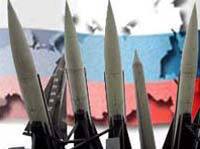Why Russia not ready for modern wars?
 Russia's military science the way it exists now does not meet the needs to the country. M. Gareyev, the President of the Academy of War Sciences, and Nikolai Makarov, the Chief of General Staff, admit that Russia is currently facing a whole bouquet of problems the solution of which may define the future of the country.
Russia's military science the way it exists now does not meet the needs to the country. M. Gareyev, the President of the Academy of War Sciences, and Nikolai Makarov, the Chief of General Staff, admit that Russia is currently facing a whole bouquet of problems the solution of which may define the future of the country.
According to Gareyev, Russian media outlets undermine the "defense consciousness of people" if they say that there is no danger to Russia. Gareyev is certain that a threat to Russia is real. Russia would soon have to stand up for its rights in geopolitical wars, the official added. It has been a very long time since the moment when Russia was in such a complex situation before. If the country does not estimate circumstances accordingly, the whole nation may find itself in the situation similar to that on June 22, 1941.
According to the official, Russia must concentrate its efforts on the modernization of the air and space defense, first and foremost.
Nikolai Makarov also believes that there are many threats that Russia is facing in the world today. Speaking about Russia's military science, the official said that it is "separated from the war, whereas war is separated from science." According to him, there are 1,200 doctors of sciences and over 6,000 candidates of sciences in the country dealing with defense issues. However, there are not many state-of-the-art military developments in the country.
It is an open secret that air warfare now plays the key role in armed conflicts of modern times. It happened so in Iraq, Bosnia and Yugoslavia. The inability of those countries to respond to air strikes eventually resulted in their defeat. Now one may witness the same happening in Libya, where Gaddafi's troops are helpless in front of NATO's aviation.
According to Nikolai Makarov, this is exactly what the Russian science is missing. Russia has not been able to take the military art to the new, modern level, but continued to live under previous standards of large-scale wars which have become a matter of the past.
Alexander Khramchikhin, deputy director of the Institute for Political and Military Analysis, agrees that Russia does have many problems related to military science.
"However, it seems to me that our military scientists are too much preoccupied with anti-Americanism. Let's take the Academy of Military Sciences, for example. I read a report prepared by their experts, about the US-British operation in Iraq in March-May of 2003. This was just nightmare. The report said that the Americans hadn't done much there. As a matter of fact, the Americans executed all their goals within a very short period of time. Gareyev is nearly 80, but he still looks good, and it seems that he does all the work in the academy. I have to say that the crisis of military sciences in Russia appeared 30 years ago."
An anonymous source from the Academy of Military and Space Defense Named After Zhukov also told Pravda.Ru that Russia indeed had a lot of deal with from the point of view of military science.
"I'd start from saying that our academy still remains under the threat of closure. No one has told us whether the academy is going to be preserved or not, and it goes about the only academy in the country that prepares personnel for military-space forces. We have been deprived of one of the most important constituents - ballistic missile defense. This department has been handed over from our academy to Mozhaisky Academy. Many employees had to quit their jobs as a result. The department was relocated 600 kilometers far away, and the people were not provided with new homes there. Most patriotic employees decided to commute back and forth, but nobody covered their transport costs, and they stopped doing it too.
"It seems that the current reforms in the Russian armed forces have only one goal - to reduce their strength. The reforms affected the military science in general too. They just keep on sacking people," the anonymous source said.
Mikhail Alashev, a former employee of a Russian military think tank:
"When I was resigning from service as a captain, my salary was nearly 15,000 rubles ($500) a month. My peers were working as common sales managers, making up to 50,000 rubles ($1,600) a month. My wife could not work at that time, she was on a child care leave, and I had to do something to survive. I went to commerce and succeeded there. The level of my income increased considerably.
"It is very funny to compare this with all those lies that one can hear and see on television. They keep saying that things are just fine. They are not," the man said.
Sergei Balmasov
Pravda.Ru
Subscribe to Pravda.Ru Telegram channel, Facebook, RSS!




